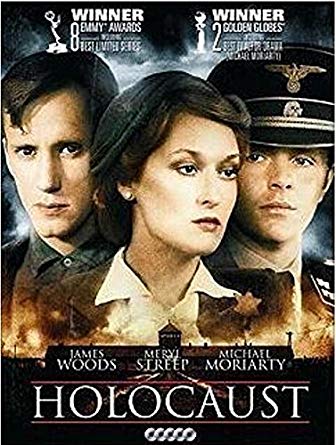40 years after it has first been aired in Germany, the American TV-mini-series, Holocaust (1979) will be shown again on German public television for the first time ever since, starting next week. The reason, besides the series‘ 40th anniversary, is its timeliness in the light of the recent wave of antisemitism in Germany (as well as elsewhere).

As someone who frequently gives Jewish Heritage tours here in Berlin, I reckoned it might be a good idea to also watch the series once more, having first seen it as a teenager back in the day. And to avoid having to watch the dubbed version on TV next week, I rented it from my local video store (yes, they still exist!).
Holocaust sparked enormous debate, not just – but especially in – Germany at the time and is widely regarded as the beginning of Germany’s coming to terms with its history in a broader sense. Meaning, besides the courtrooms in which but a tiny number of butchers were held accountable for what they did at Auschwitz, Treblinka, Sobibor, Chelmno, and elsewhere. But if it had taken just this tiny number, the Holocaust would hardly have been possible. And it apparently took a series, a film, like Holocaust to drive that message home where it belonged: straight into the homes of ordinary Germans. But more than that, it is one thing to read about a book-keeper being sentenced for once having been a guard at Auschwitz (though there had been few enough who actually were!), and yet another seeing the tragic events unfold before your eyes, never mind that the Weiss family, around whom the series revolves, is fictional. Everything else is real. Real inasmuch as the chronology of events, the creation of the Warsaw Ghetto, the construction of the death camps, and so on, are used as fixtures, so to speak, to let the fate of the Weiss family unfold.
And because the (fictional) story is based on historic facts, Holocaust doesn’t seem dated. It is, however, very painful to watch and starting with Episode 3, I had lumps in both my throat and my stomach and occasionally, I even had turn my eyes away from the screen. And yet, the film is neither melodramatic nor gratuitous in its depiction of violence. Quite the opposite. In fact, because Holocaust was made for television and thus for a wide audience, it seems almost unusually restrained.
But it’s always what isn’t shown that hits you the most, isn’t it?
A record number of German households watched the series in 1979, many viewers having been confronted for the very first time with the pain and terror inflicted by their ancestors – or in some cases: by them! – on European Jewry. And though Holocaust is about a Jewish family, the fact that other minorities also suffered at the hand of the Nazis, and that the gassings were first „tried“ on the mentally disabled does get mentioned as do the infamous firing squads that preceded them (until they were deemed „inefficient“).
The German broadcaster was inundated with phone calls at the time. So much so, that more phone lines had to be made available. Viewers expressed their horror, their shock, their surprise, and sometimes their anger and disbelief at what they’d just seen on-screen.
It’ll be interesting to see how the reaction this time, 40 years later, will be.
Views: 116

